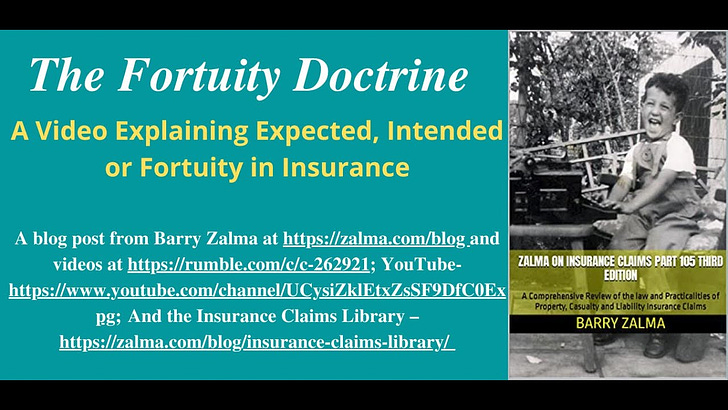Read the full article at https://www.linkedin.com/pulse/fortuity-doctrine-barry-zalma-esq-cfe-1c and see the full video at Rumble.com at https://rumble.com/zalma and at
and at https://zalma.com/blog plus more than 3900 posts.
Posted on September 14, 2021 by Barry Zalma
See the full video at Rumble.com at https://rumble.com/zalma and at
The Fortuity Doctrine arises from the basic concept upon which insurance is founded: that insurance covers risks, not losses that were planned, intended, or anticipated by the insured. It has always been the view of insurers that losses that were expected by the insured could not be insured. To do so would have a counterproductive effect. No one would buy insurance until they were certain they would have a loss. The concept of spreading the risk on which insurance is based would be defeated.
An accident or occurrence is never present when the insured performs a deliberate act unless some additional, unexpected, independent, and unforeseen happening occurs that produces the damage. when the injury was caused by the insured’s manufacture and sale of products the manufacture and sale of products without right were deliberate and intentional acts, and there were no additional, unexpected, independent, and unforeseen happenings that caused the infringement alleged by the plaintiff or the indemnity obligation. The court concluded that the conduct giving rise to the underlying action was not an “accident” nor an “occurrence” within the coverage provision. because there was no potential basis for coverage, there is no duty to defend.6
The Loss-In-Progress Rule codifies a fundamental principle of insurance law that an insurer cannot insure against a loss that is known or apparent to the insured. (See Bartholomew v. Appalachian Ins. Co. (1st Cir. 1981) 655 F.2d 27, 28-29.) The public policy rule is premised on the view that to hold the insurer liable for a progressive and continuing property loss that was discovered before the carrier insured the risk would be to impose upon the insurer a guaranty of the good quality of the property insured, which liability under the policy the insurer had not assumed. (Greene v. Cheetham (2d Cir. 1961) 293 F.2d 933, 937.)
In Montrose Chemical Corp. v. Admiral Ins. Co. (1995) 10 Cal.4th 645, 691, 693 where the existence and extent of injuries were unknown from the insured’s “standpoint,” coverage of continuous or progressively deteriorating property damage under a CGL policy did not offend the loss-in-progress rule.
The Fortuity Doctrine Or “Loss in Progress” Rule, where damage began to occur prior to the inception of the policy, requires that, as a matter of law, no part of the loss may be insured against. (See E.G., Summers v. Harris, (5th Cir. 1978)573 F.2d 869, 872; Presley v. National Flood Insurers Association (E.D. Mo. 1975) 399 F. Supp. 1242. The Fortuity Doctrine only precludes a party from insuring against a loss that has occurred or is certain to occur within the term of the policy. (See, E.G., Sabella v. Wisler (1963)59 Cal. 2d 21, 34 [27 Cal. Rptr. 689, 377 P.2d 889]; Standard Structural Steel v. Bethlehem Steel Corp. (D.Conn. 1984) 597 F.Supp. 164, 193; Essex House v. St. Paul Fire & Marine Insurance Co. (S.D. Ohio 1975) 404 F.Supp. 978, 988-990; Avis v. Hartford Fire Insurance Company (1973) 283 N.C. 142 [195 S.E.2d 545, 548].)
ZALMA OPINION
Everyone involved in the insurance industry must understand the doctrine of fortuity. Without fortuity insurance makes no sense.
© 2021 – Barry Zalma
Go to the podcast Zalma On Insurance at https://anchor.fm/barry-zalma; Follow Mr. Zalma on Twitter at https://twitter.com/bzalma; Go to Barry Zalma videos at Rumble.com at https://rumble.com/zalma; Go to Barry Zalma on YouTube- https://www.youtube.com/channel/UCysiZklEtxZsSF9DfC0Expg; Go to the Insurance Claims Library – https://zalma.com/blog/insurance-claims-library/ The last two issues of ZIFL are available at https://zalma.com/zalmas-insurance-fraud-letter-2/ podcast now available at https://podcasts.apple.com/us/podcast/zalma-on-insurance/id1509583809?uo=4
Zalma on Insurance Claims Part 105 Third Edition:
by Barry Zalma | Sep 2, 2021
Kindle $9.95 Available instantly
This is the fifth part of a Treatise on Insurance Claims consisting of a series of ten books, of which this is the latest addition to Barry Zalma’s insurance claims Treatise that will form the most thorough, up-to-date, expert-authored insurance claims guide available today.
Written by nationally-renowned insurance coverage expert Barry Zalma, a semi-retired insurance coverage attorney, consultant, expert witness and blogger, Zalma on Insurance Claims provides in-depth explanations, analysis, examples, and detailed discussion of Property insurance claims; Third-party liability claims; Casualty claims; and Insurance Fraud.
Thorough, yet practical, this fifth part of the ten-part treatise form the ideal guide for any professional who works in, or frequently interacts with, the insurance industry. Claims professionals, risk managers, producers, underwriters, attorneys (both plaintiff and defense), and business owners will benefit greatly from the ten volume Treatise. It is also the perfect resource for insurance educators, trainers, and students whose role requires an understanding of insurance law.
As you read through the various volumes of Zalma on Insurance Claims, you will find comprehensive—yet comprehensible—coverage of key topics, dealing with all property, casualty and liability insurance.
Table of Contents
Chapter 1 Investigation Of Liability Claims.
Chapter 2 Errors & Omissions & the Claims Made & Reported Policies
Chapter 3 The Notice-Prejudice Rule.
Chapter 4 Types Of Torts.
Chapter 5 The Liability Claim File.
Chapter 6 Duty To Defend.
Chapter 7 Tests For Determining Duty To Defend:
Chapter 8 Scope Of The Duty To Defend.
Chapter 9 Grounds To Reject Coverage For Defense Or Indemnity.
Appendix 1 Form Letter To Expert
Appendix 2 Form Letter To Independent Medical Examiner
Appendix 3 Non Waiver Agreements
Appendix 4 Form Letter: Rescinding Automobile Policy.
Appendix 5 Form Letter: Rescission And Denial Letter
Appendix 6 Form Letter: Advising Of Right To Appraisal
Appendix 7 Form Letter: Reservation Of Rights Letter To Insured.
Appendix 8 Form Letter: Reservation Of Rights Letter B.
Appendix 9 Authorization Forms
Appendix 10 California Actual Cash Value Statute.




